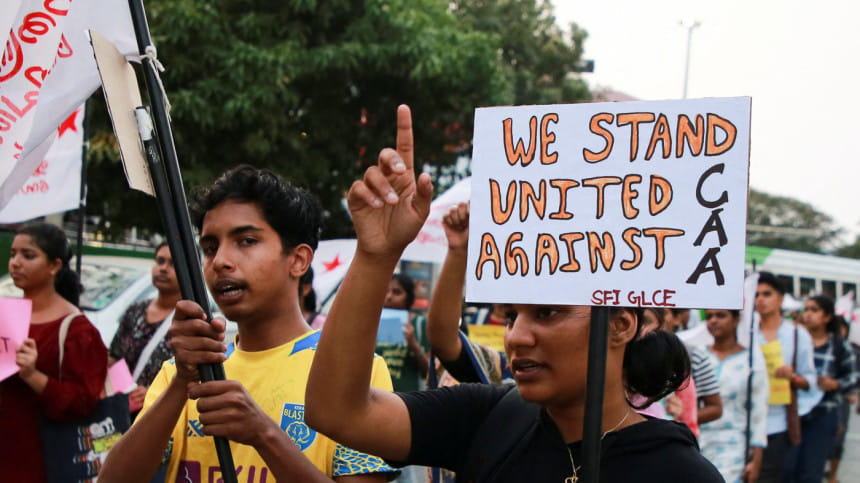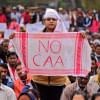10 FAQs about India's citizenship law

Any law and its implementing guidelines are a country's internal matter. So why is Bangladesh concerned about India's initiative to amend its 1955 citizenship law?
Any kind of law or policy formulation is absolutely a country's internal matter. However, Bangladesh is mentioned in India's Citizen (Amendment) Act, 2019 (also known as CAA-19). Therefore, when the announcement to put the act into effect came recently, discussions erupted in Bangladesh. Afghanistan and Pakistan are also mentioned, so it's clear that the law is not bound by the borders of India. Further evidence of this is the fact that Sri Lanka and Tibet have also been brought up in discussions about the law. As a result, this has become a legal-political issue for the whole of South Asia and will become more so in the future. But it is particularly significant for Bangladesh.
What is Bangladesh's area of concern?
There are, in fact, many concerns. This law can create issues that are of concern for Bangladesh. For instance, the law and its "rules" state that, till December 2014, those (following religions other than Islam) living in India due to persecution for religious reasons in Bangladesh could apply for citizenship there. This implies that minorities are being oppressed in Bangladesh and people are going to India to escape this persecution. The term which Indian policymakers are repeatedly using in this regard are "persecuted minorities," which is definitely of concern for us.
How is the new law contradicting India's own status as a secular country?
India claims to be a secular state, which has a constitutional basis. But under the CAA-19, it wants to give citizenship only to non-Muslims. Under no circumstances does it intend to offer the same benefit to Muslims. This means that India has chosen religion as the basis of its citizenship law. In other words, the criterion to determine the legality or illegality of individuals in India under this law is their religious identity. That's why those who view the country as secular are opposing the amendment. Formulating a law that singles out the non-Muslims from three Muslim-majority countries, that too by choosing them selectively, is novel. It appears that millions of Rohingya who have been expelled from Myanmar, one of India's neighbours, and are seeking refuge in different countries will not, in any way, benefit from this new law. Another significant development is that the law was announced to be implemented right before India's general election. This may cause religious polarisation during elections in various places. It also explains why BJP-opposing political parties are against this law.
What is the Indian government's rationale for excluding Muslims from the benefits of the act?
The Indian government says it has created CAA-19 in light of human rights. According to it, since Hindus and other minorities are being deprived of their human rights in Bangladesh, Afghanistan, and Pakistan, it is trying to give legal benefits only to non-Muslims. But interestingly, the Hindu Tamils from Sri Lanka—who came to Tamil Nadu after persecution by the Sinhalese armed forces—have not been included in the new law.
Are minorities persecuted in Bangladesh?
Everyone understands the insinuations of the CAA-19. Since the source of this view is another country's top brass, the Bangladesh administration is responsible for determining and disseminating the truth. If someone from Bangladesh presents information about religious persecution in the hopes of getting Indian citizenship under this law, then the Bangladeshi authorities have the opportunity to investigate the matter. And surely this will be done, since the country's image would be on the line. In fact, if any wrong information is spread about Bangladesh abroad, that needs to be investigated.
Why December 2014 has been chosen as the cut-off point for granting citizenship can also be questioned. For the sake of argument, does this mean that religious persecution of non-Muslims in Bangladesh, Pakistan, and Afghanistan has not occurred after that date? Before 2014, many political parties, including BNP, Awami League, and Jatiya Party, were in power in Bangladesh for different periods. Will they accept the allegation that religious persecution of minorities took place during their respective tenures? It is the responsibility of the parties to answer such questions.
Is Bangladesh's objection only because the country is being presented to the world as an "oppressor of minorities"?
No, there are more reasons, and they are beyond the scope of this law. It is being assumed that after CAA-19 is enacted, the implementation of NRC (National Register of Citizens) will be announced in all of India, including West Bengal. This has been assumed based on the various statements of Indian policymakers who have been talking about taking a series of steps on citizenship and immigration. All this means that, at first, non-Muslims will be given citizenship, and then the NRC will be implemented. On December 10, 2019, India's union home minister said that NRC will be implemented in the entire country. Needless to say, if most of the non-Muslims get citizenship through CAA-19, then Muslims without citizenship papers will be entrapped by the NRC. Worryingly, what will India do with these potential "illegal Muslims"?
Why is Bangladesh concerned about what India will do with its "illegal" people?
Herein lies the problem. A person may not have valid citizenship papers for a multitude of reasons, but it's seen that, in places like West Bengal and Assam, Muslims without documents are assumed to be from Bangladesh. This means that Muslims "caught" in the NRC may be labelled as "Bangladeshis." When NRC was implemented in Assam, over 19 lakh people couldn't show their citizenship papers, and they were said to be Bangladeshi. But those so-called Bangladeshis repeatedly said they are natives of Assam and don't have documents due to different reasons. Aside from Hindus (the majority) and Muslims, many among them were Gorkhas and Rajbanshis. At that time, many Hindutva organisations were saying that "illegal" Hindus should be given citizenship before the NRC. Perhaps based on that experience, the Indian government has now taken the initiative to free Hindus from the troubles of the NRC via CAA. Since Muslims will not get benefits under CAA, if the NRC is implemented across India, Muslims without citizenship documents will be in trouble. And the fear of labelling them as Bangladeshis is always there.
Many speculate that such a situation will not happen due to strong Bangladesh-India ties. Then why is India making such claims and making Bangladesh worried?
It's true that the present governments of Bangladesh and India have friendly ties. Based on that, it can be assumed that the Indian government will not mention the presence of "illegal Bangladeshis" within its borders. However, national and religious leaders have used the term "illegal Bangladeshi" several times during political rallies in Assam, Tripura, and West Bengal. The biggest argument is that Bangladesh has been identified as an "oppressor of minorities" under CAA during this very period of "friendship." So, it's natural to question how the Indian government really sees this friendship.
Incidentally, it should also be mentioned that there is a change in the propaganda and administrative strategies within India regarding the alleged illegal Muslims. Now, they are being called "illegal Rohingyas" instead of "illegal Bangladeshis."
If India calls them "illegal Rohingyas," why would it be a problem for Bangladesh?
India is not a signatory to the International Refugee Convention. When someone is referred to as "Rohingya" in the country, that person is not granted refugee status; the administration deals with such individuals using the Foreigners Act. India also says that the so-called Rohingya are a "security threat." As a result, the state's treatment of these "security threats" will definitely be very strict. The question is: will these "security threat-illegal foreigners-Rohingya Muslims" be jailed? Or will those "illegal Rohingyas" of India want to go somewhere else under administrative, legal, and social pressures? Since the main refugee camps of the Rohingya are in Bangladesh, whether the country will become involved in this discussion is a pertinent question.
Sections 3 and 5 of India's Foreigners Act empower the government to detain such people. After the NRC, there is fear of a humanitarian disaster involving people who do not have citizenship documents.
Many experts in India say that if the NRC is implemented after the CAA, many Hindus may also face problems regarding citizenship. Due to various personal and social reasons, many Hindus would not be able to show their citizenship papers. A recent example of this is a Hindu youth taking his life in fear of being deemed illegal, after failing to find his documents. This shows that the fear has also spread among Hindus in India. Where will they go? Where will they take refuge?
Isn't it up to India to decide what it will do with its illegal citizens and whom it will grant "refugee" status?
What's strange, however, is that India grants refugee status to Tibetans and Sri Lankan Tamils within its territory, but has decided to not bestow the same benefit to Muslims, by labelling them "Rohingyas." The reason may be that people are being seen through the lens of religion and politics. Ironically, the world is also seeing it through the same lens. Even in Bangladesh, people are concerned about the CAA because of its perceived impact on the fate of Muslims.
Altaf Parvez is a researcher of history.
Views expressed in this article are the author's own.
Follow The Daily Star Opinion on Facebook for the latest opinions, commentaries and analyses by experts and professionals. To contribute your article or letter to The Daily Star Opinion, see our guidelines for submission.

 For all latest news, follow The Daily Star's Google News channel.
For all latest news, follow The Daily Star's Google News channel. 










Comments